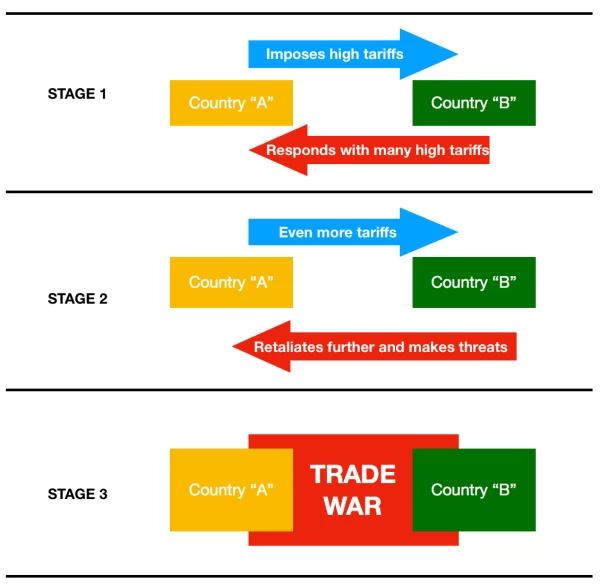A trade war is a situation stemming from extreme protectionism, in which two countries attack each other’s trade with tariffs or quotas.
Cambridge Dictionary defines a trade war as “a situation in which two or more countries raise taxes and import quotas (= limit the quantity of goods) in an attempt to protect their own economies”.
A tariff is a tax imposed on goods produced abroad. Customs officers collect customs duties and the proceeds go to the government.
A small trade dispute between the two countries could eventually lead to a real trade war if both continue to retaliate. When a country increases taxes on another country, that country may encourage the other country to impose retaliatory tariffs. This could trigger a series of give and take, leading to a trade war.
Trade wars often begin when one country imposes trade barriers on another country to protect a particular domestic industry.
Stages of a trade war:

Given the retaliatory nature of a trade war, it is difficult to prevent it. It can also take a long time to undo all the tariffs imposed during the economic conflict.
Trade wars have existed for centuries. In some cases, they have led to military conflicts between nations.
For example, in 1839, the Qing government blockaded their ports and detained British merchants. In response, the British government sent its navy to China, sparking the Battle of Kowloon and the First Opium War.
Trade wars can also have dire economic effects. One of the most important trade wars took place in the United States in 1930. Under the Hawley-Smoot Tariff Act, tariffs are imposed on more than 20,000 goods imported into the United States. The United States imposes tariffs because it believes it will protect American farmers and secure the national economy. However, America’s trading partners fought back and the ensuing trade war made it difficult for the US to emerge from the recession it was experiencing at the time.
Claude Barfield, resident scholar at the American Enterprise Institute, was quoted by History.com as saying that the Smoot-Hawley Tariff Act “prolonged [the Recession] and perhaps exacerbated it around the world. , not only in the United States but also in other countries”

